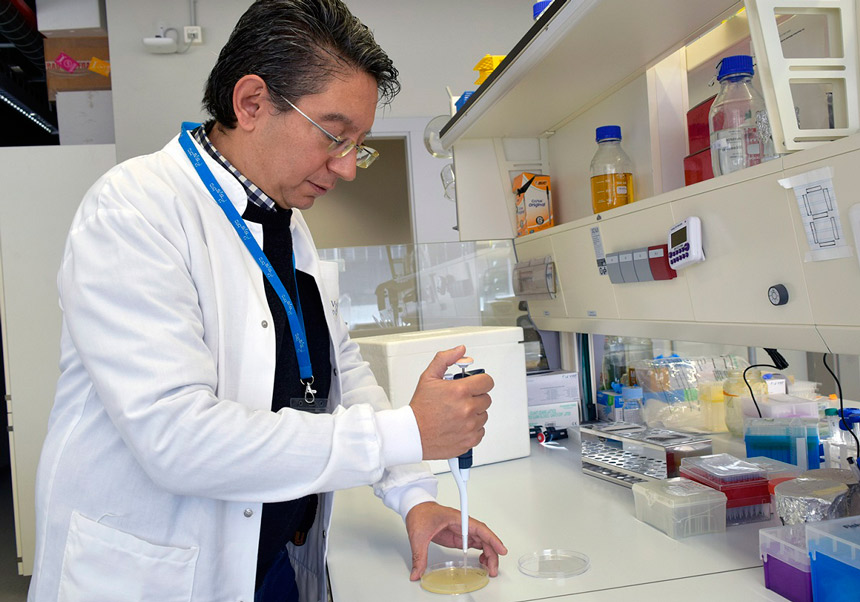Users
Social media
- More details here...
- Address
Parc Científic de la Universitat de València C/
Catedrático Agustín Escardino, 9
46980 Paterna (Valencia) Spain - Email:
iu.i2sysbio@uv.es - Phone:
(+34) 963544810
- Address
Links
Tailored smart phage-based molecules induce rapid death of resistant bacteria

Investigation
Tailored smart phage-based molecules induce rapid death of resistant bacteria

Scientists from i2SysBio (CSIC-UV) develop a strategy to personalized antibiotics that avoid bacterial resistance.
Infections caused by antibiotic-resistant bacteria will overtake cancer as the leading cause of death in the world in 2050, according to the World Health Organization (WHO). Faced with this threat, a research group from the Institute of Integrative Systems Biology (i2SysBio), a joint center of the Higher Council for Scientific Research (CSIC) and the University of Valencia (UV), develops a molecule based on bacteriophages or phages, viruses that kill bacteria, to cause their death by depolarization of the cytoplasm, which causes the bacteria cells to not maintain the electrical charge to carry out their vital functions and die. irreversibly.
Antimicrobial resistance (AMR) already causes more than 35,000 deaths in Spain, according to the Spanish Society of Infectious Diseases and Clinical Microbiology. In addition, it causes four million serious infections a year. According to the WHO, in 2050 this great threat to public health that already causes 700,000 deaths a year could surpass cancer as the leading cause of death, causing 10 million deaths annually.
One of the most promising alternative therapies to conventional antibiotics are bacteriophages or phages. They are viruses that infect and parasitize bacteria, and are the most abundant biological entities on the planet. Each phage is specific to a certain genus or bacterial species, which allows it to be directed against a specific bacteria. They act like other viruses: they bind to an existing receptor on the bacterial surface and inject their genetic material inside, they replicate and destroy it.
However, “bacteria have a defense system that can also make them resistant to phages,” argues Alfonso Jaramillo, CSIC researcher at I2SysBio. Its De Novo Synthetic Biology laboratory has just begun a project to develop a molecule imitating ones that already exist in nature and that looks like a phage, but is not. Although these molecules were known, it had never been possible to evolve them, which is necessary to kill bacteria of interest. “These are headless phages, capable of piercing the membrane of the bacteria, but without introducing their DNA,” explains Jaramillo.
Thus, these molecules would induce the death of the bacteria by depolarizing the cytoplasm. “By piercing the membrane, a charge difference is produced where the ions escape, causing the death of the bacteria,” says the CSIC researcher. “There is no known bacterial resistance against this effect,” he maintains. His team intends to develop these molecules by combining genetic engineering with evolution, thanks to a grant from the 'La Caixa' Foundation's research program of nearly half a million euros.
Phages that are not
The I2SysBio research team intends to use evolution to create antimicrobial molecules based on the proteins that phages produce to insert their DNA into bacteria. To do this, they are going to develop a technology capable of accelerating the evolution of phages a million times, allowing phages to be obtained without a head (capsid). In addition, it will allow us to anticipate the mutations that could make bacteria resistant and thus adapt the antimicrobial molecules to those mutations.
Thus, the antibacterials that will be developed thanks to this project are mere groups of proteins, not viruses. They cannot replicate, either in the bacteria or in our own body, and they will be harmless to beneficial bacteria, which will resolve one of the undesirable effects of current antibiotics.
According to Jaramillo, this strategy maintains the advantages of phage therapy that is applied today against AMR, but allows obtaining antimicrobials that avoid possible resistance of the bacteria to the phage. Furthermore, as these are molecules that, unlike phages, do not evolve and are also not genetically modified organisms, their health authorization would be easier. It would also be a faster and cheaper method, since the molecules would be obtained by fermentation in bioreactors.
The project, which lasts 3 years starting in January 2023, wants to demonstrate that this technology is useful and viable for the production of antimicrobial agents.
Source: CSIC


